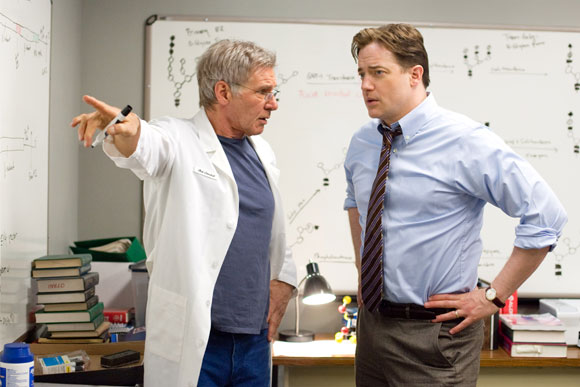Extraordinary Measures

The very words “inspired by” or “based on a true story” raise my hackles. In this case, the film is “inspired by true events,” meaning obviously some events were untrue. It’s also an adaptation of the book by Geeta Anand, The Cure: How a Father Raised $100 Million – And Bucked the Medical Establishment – in a Quest to Save His Children, itself inspired by, based on, adapted from, whatever, the story of John Crowley who fought to get a treatment for his children—both diagnosed with Pompe Disease, though the daughter’s is in the advanced stages.
Yes, John Crowley, played in the film by a severely miscast Brendan Fraser, did leave Bristol-Myers Squibb to run Novazyme (sold to Genzyme, renamed Zymagen in the film), which was doing research on an experimental treatment for Pompe Disease. No, Dr. Robert Stonehill (Harrison Ford at his grumpiest I’ve ever seen), is not a real person. This character, a research professor from University of Nebraska, was created purely to give Crowley someone to work with, and against, for dramatic tension. So, essentially, much of the film is a fabrication. But that isn’t the problem.
The errors in making this film begin with recycling the same cinematic clichés used in every other film where a father fights the “system” to keep one or more of his kids alive. His seemingly-uninvolved wife, Aileen (Keri Russell), is in tow exclusively for that scene where she’ll express doubt in his crusade and a need to accept reality. Never mind the children’s suffering. Oh, but wait! We even have the inexplicably heartless doctor who says, “Maybe you can find comfort in that her suffering will be over.” It seems there’s one jackass doctor for every desperate father in America.
The entire story revolves around the unethical lengths to which Crowley will go, using company resources ultimately to his children’s advantage, thwarting proper research protocols and constantly arguing with every expert in the field despite himself being a consultant with zero medical/scientific experience. This, in addition to Mr. Fraser’s quaalude-haze delivery, makes the character unbelievable, and largely detestable.
Enter Dr. Stonehill who, in that tradition of single-purpose characters invented as plot devices, behaves just as his name suggests—immovable, with an elevated opinion of himself. His purpose is also to argue and drive everyone mad. That is, until he meets Crowley’s perky daughter, Megan (Meredith Droeger) and the tacked-on son, Patrick (Diego Velasquez). “I never help a single human being in reality,” Dr. Stonehill observes of his academic research. We get it now, the filmmakers and/or studio thought audiences would rather see Ebenezer Scrooge have a change of heart than a well-written story with depth of narrative and character.
The director, Tom Vaughan, focused more of our attention on Megan clearly because her situation is more imminent. But the neglect of character development shouldn’t go unnoticed. We don’t learn a lot about Megan or Patrick as people, except that she likes to pick on her brother and play with a radio-controlled Barbie car. How does that help us feel connected to her cause?
This is another, emotionally-contriving film made purely to take advantage of the staple of shallow cinema: traumatized children. The trauma, sometimes physiological, sometimes psychological, often both, has manifest in numerous mediocre films of late, most recently The Blind Side and The Lovely Bones. Wheeling out sick, traumatized, mentally ill, abused, or economically-disadvantaged children for heartstring-tugging melodrama seems to be the go-to plan for studios seeking refuge in financially-difficult times, rather than actually developing a genuinely good story with interesting characters we can care about. But that would take effort.
 Extraordinary Measures • Dolby® Digital surround sound in select theatres • Aspect Ratio: 1.85:1 • Running Time: 105 minutes • MPAA Rating: PG for thematic material, language and a mild suggestive moment. • Distributed by CBS Films
Extraordinary Measures • Dolby® Digital surround sound in select theatres • Aspect Ratio: 1.85:1 • Running Time: 105 minutes • MPAA Rating: PG for thematic material, language and a mild suggestive moment. • Distributed by CBS Films